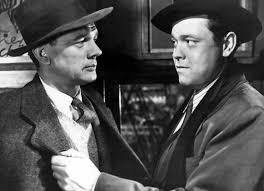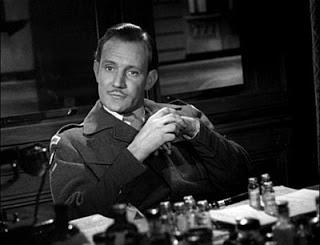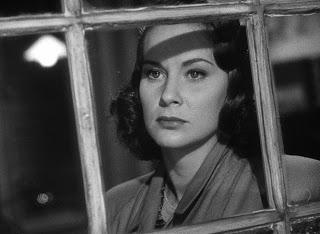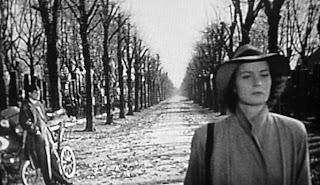
"The world doesn't make any heroes outside of your stories."
Some movies are so flawless, their existence seems a miracle. Carol Reed's The Third Man (1949) synthesizes Graham Greene's literary skill, David O. Selznick's Hollywood resources, Alexander Korda's know-how and Orson Welles' erratic brilliance. Not only a high point in British cinema, this complex thriller is one of the best films ever made.Hack writer Holly Martins (Joseph Cotten) arrives in postwar Vienna, occupied by the Allies and reeling under rationing. Martins finds his lifelong friend Harry Lime (Orson Welles) dead under suspicious circumstances. Warned off the case by British Major Calloway (Trevor Howard), Martins insists on investigating, discovering Harry's involvement selling black market penicillin. He's enmeshed in a web of shady characters, all before discovering Harry might not be dead.
The Third Man captures Europe's postwar ambivalence better than any film. Reed shot largely on location in Vienna, evoking the blasted-out authenticity of Germany Year Zero with stars and a budget. The Allies bicker over jurisdiction; Soviet authorities interfere with Calloway's investigation by detaining Harry's lover, Anna (Alida Valli) over a passport kerfuffle. Vienna's citizens perch between normalcy and destitution; lacking food and medicine, they attend cinemas and operas.

"Leave death to the professionals."
Reed and Graham Greene collaborated previously on The Fallen Idol, an interesting premise stretched thin. The Third Man is fuller all around. Greene's sharp writing absorbs viewers in Holly's disorientation. Scenes play in unsubtitled German, leaving Holly in the dark; friendly Viennese become accessories or victims. Even Major Calloway's levelheadedness does little good. With Vienna tolerating corruption, neither amateur sleuth nor policeman stands much chance.Holly and Harry present opposing faces of America: Holly the innocent abroad, Harry the amoral capitalist. Holly earnestly believes the simplistic morality embodied by his Westerns. He's out of his depth attending German opera or lecturing literati, let alone navigating Cold War tensions or unraveling Vienna's black market. He tries to help Anna, who's indifferent to his attentions and unwilling to abandon Harry. For Holly, Austria might as well be Mars.
Harry Lime naturally dominates The Third Man. He's a gangster who reduces people to suckers to exploit, eschewing morality. Channeling Chaplin's Monsieur Verdoux, he defends his actions as trifling next to state-sanctioned crimes. He's also a charmer whose charisma draws suckers into his orbit. Holly only turns against him when confronted with victims; Anna never does. Harry lived on in a radio series and television show, charming viewers who also overlooked his sociopathy.

"A person doesn't change just because you find out more."
Reed's direction employs omnipresent Dutch angles and lighting tricks to enhance unease. Robert Krasker's looming shadows evoke Welles' own directorial work, though Reed borrows cues from Fritz Lang's M (the balloon salesman, a boy with a rubber ball) and Hitchcock's The 39 Steps (Holly's lecture), along with an animal motif (Harry's telltale cat, a hostile parrot) emphasizing Vienna's amorality. Then there's Anton Karas's zither music, surely one of cinema's most eccentric scores; its playful jangling provides ironic counterpoint to the sordid story.The Third Man's key scenes are instantly identifiable. An expert montage, where Calloway lays out the damning evidence. Harry revealed in a doorframe, beaming puckishly at a disbelieving Holly. The tense conversation at the Riesenrad, with Harry and Holly debating ethics on a Ferris wheel, culminating in an immortal observation about cuckoo clocks. The climactic sewer chase, with Harry surrounded by echoing shouts and deafening splashes, trapped by police and cornered by Holly.
Joseph Cotten makes Holly compelling enough to avoid seeming a complete fool. Trevor Howard's unflappable wariness provides fine counterpoint. Alida Valli, generally ill-used by Hollywood (remember The Paradine Case?), is hauntingly desperate. Wilfrid Hyde-White, Bernard Lee and Siegfried Breur give solid character turns. But how can they compete with Orson Welles? With a dynamite entrance, a boyish grin and a nifty monologue, Welles steals the movie in three brief scenes.

"We should have dug deeper than a grave."
By film's end, The Third Man leaves viewers and characters exhausted. Harry's dead, Holly's faith shattered. Reed settles on a static shot, with Anna walking between concentric tree lines, past Holly and towards an empty future. All with Karas's zither jangling away. It's the perfect end to this morally ambivalent masterpiece.
